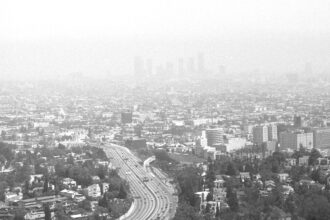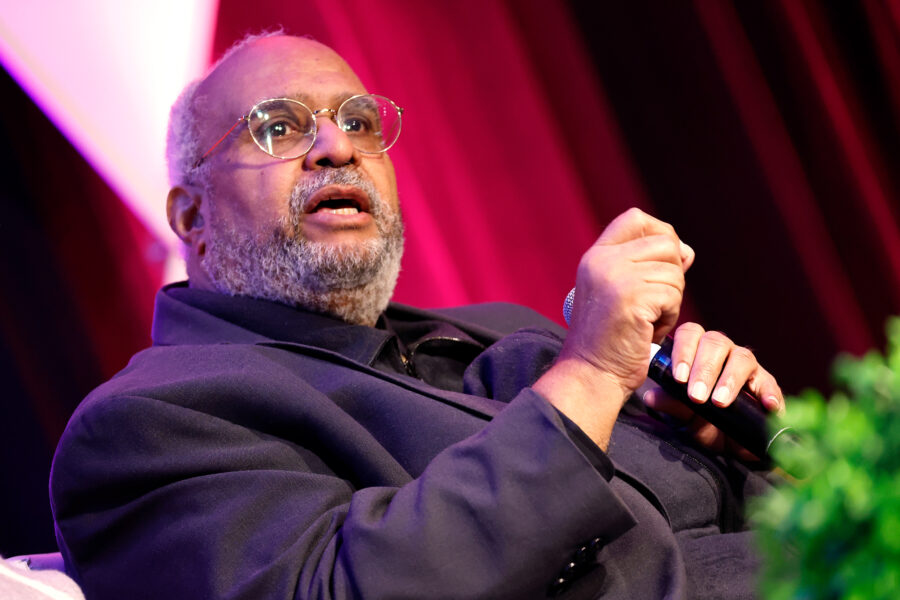President Donald Trump signed congressional resolutions Thursday morning to repeal California’s pioneering vehicle emissions standards, which he called a “disaster for this country.”
California was ready.
“We made a promise that if the president attempted to illegally interfere with our clean air standards, we’d hold him accountable in court,” California Attorney General Rob Bonta said in a press briefing the same day. “Today, we are making good on that promise.”
Bonta filed a complaint in the U.S. District Court for the Northern District of California along with attorneys general from 10 states that follow California’s pioneering emissions standards. The complaint asks the court to declare that the resolutions “have no effect on the status or enforceability of state emissions control programs.”
The resolutions Trump signed repeal California’s landmark rule to ban sales of new gas-powered cars by 2035, along with two other rules passed as a result of clean air waivers granted by the Biden administration. The Republican-led Congress passed the resolutions using a tool called the Congressional Review Act—illegally, experts say—to block the state’s authority to ask the Environmental Protection Agency to grant waivers to enforce stricter standards.
“They said it couldn’t be done,” Trump said. “But boy, it’s had us tied up in knots for years.”
California’s authority to set stricter air pollution standards than the federal government dates back to the 1960s.
By the time the first national air-pollution regulations were enacted in 1967, California had already passed first-in-the-nation tailpipe standards to deal with the abundance of cars and people in Los Angeles that, combined with pollution-trapping mountains, perpetually shrouded the city in hazardous smog. Congress recognized the state’s “compelling and extraordinary circumstances,” both in having unique pollution challenges and expertise in controlling them, and directed the EPA to waive provisions barring states from passing stricter standards than those set by the federal government.
The EPA has granted California waivers in various forms more than 100 times since 1967.
When asked why the administration believes it has the right to repeal authority repeatedly granted to California under the Clean Air Act, EPA spokesperson Molly Vaseliou said, “it’s Civics 101.”
Both chambers of Congress pass legislation and the president signs it into law, Vaseliou said. “This is nothing more than California throwing a temper tantrum because the American people don’t want the state’s terrible policies. The complaint lacks merit, and we look forward to a swift dismissal.”
No Legal Authority
The complaint charges the federal government with illegally using the Congressional Review Act, or CRA, to attack California’s clean vehicles program. The Biden administration granted California three waivers to enforce that program, which includes the EV mandate to phase out sales of new gas-powered cars by 2035, as well as rules to move toward zero-emission trucks and heavy-duty vehicles.
Both the Republican-led House and Senate treated the waivers as rules so they could pass “resolutions of disapproval” and revoke the waivers, even though the nonpartisan Government Accountability Office had determined that the waivers are not rules and so are not subject to the CRA. The Senate parliamentarian, also a nonpartisan referee, later came to the same conclusion: Waivers are not rules.
This story is funded by readers like you.
Our nonprofit newsroom provides award-winning climate coverage free of charge and advertising. We rely on donations from readers like you to keep going. Please donate now to support our work.
Donate Now“These waivers have never under any administration, Democrat or Republican, been considered rules that are subject to disapproval under the CRA,” Bonta said. “What we’re seeing is a thinly veiled attempt by the President to retaliate against California for choosing progress over regression.”
Just a few hours after Bonta spoke, Democratic California Sen. Alex Padilla, who fought Republicans’ attempts to block his state’s right to enforce the nation’s toughest clean air rules, was forcibly removed from a news conference Department of Homeland Security Secretary Kristi Noem held on immigration enforcement in Los Angeles.
Padilla, a native of Los Angeles, where the Trump administration deployed the National Guard over Gov. Gavin Newsom’s objections, was wrestled to the ground and handcuffed, even though he told the agents who he was.
The day before, Padilla vowed to block all EPA nominations “until Republicans allow California to protect the health of its residents” by reinstating the waivers.
When the Senate voted last month to rescind the waivers, Democratic senators charged their Republican colleagues with using parliamentary tricks to unlawfully invoke the CRA. The CRA allows Congress to quickly rescind rules passed by federal agencies within a limited time frame with a simple majority vote rather than the 60 votes needed under the filibuster rule.
“Under both Republican and Democratic administrations, California was consistently granted waivers under the Clean Air Act to implement stronger standards to help ensure cleaner air for our families,” said California Sen. Adam Schiff in a statement after Trump signed the resolutions. “By eliminating the filibuster and passing these polluter resolutions, President Donald Trump, EPA Administrator Zeldin and Republicans in Congress are undermining our state’s ability to protect the health of millions of Americans.”
California’s emissions standards are critical to reducing harmful pollution and protecting public health, which is “good for our people and good for our planet,” Bonta said.
Tens of millions of Californians, or nearly 9 in 10 residents, breathe some of the most polluted air in the country, reports from the American Lung Association show. Research shows that air pollution contributes to respiratory and cardiovascular illnesses, cancer and a million premature deaths globally each year.
California’s clean-vehicle regulations were created to address these issues, Bonta said.
“The bottom line is simple,” Bonta said. “The president doesn’t have the legal authority to weaponize the CRA against California, and we won’t let him use the CRA for his political gain, not when we’re facing worsening air pollution and a climate crisis that’s already endangering our communities.”
About This Story
Perhaps you noticed: This story, like all the news we publish, is free to read. That’s because Inside Climate News is a 501c3 nonprofit organization. We do not charge a subscription fee, lock our news behind a paywall, or clutter our website with ads. We make our news on climate and the environment freely available to you and anyone who wants it.
That’s not all. We also share our news for free with scores of other media organizations around the country. Many of them can’t afford to do environmental journalism of their own. We’ve built bureaus from coast to coast to report local stories, collaborate with local newsrooms and co-publish articles so that this vital work is shared as widely as possible.
Two of us launched ICN in 2007. Six years later we earned a Pulitzer Prize for National Reporting, and now we run the oldest and largest dedicated climate newsroom in the nation. We tell the story in all its complexity. We hold polluters accountable. We expose environmental injustice. We debunk misinformation. We scrutinize solutions and inspire action.
Donations from readers like you fund every aspect of what we do. If you don’t already, will you support our ongoing work, our reporting on the biggest crisis facing our planet, and help us reach even more readers in more places?
Please take a moment to make a tax-deductible donation. Every one of them makes a difference.
Thank you,













